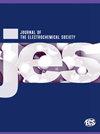不同外部电位和初始缝隙条件下不锈钢缝隙腐蚀引发行为的数值分析
IF 3.1
4区 工程技术
Q2 ELECTROCHEMISTRY
引用次数: 0
摘要
对海水中不锈钢缝隙结构内的电位、电流密度、pH 值和缝隙剖面分布进行了数值分析。缝隙腐蚀现象的数学模型分别是扩散和静电场的初始边界值问题。该初始边界值问题采用有限差分法离散化。根据不同的外部电势和初始缝隙,缝隙腐蚀行为的预测结果分为三类:点蚀型、活性型和无腐蚀型。根据预测,点蚀型缝隙腐蚀发生在外部电位较高、初始缝隙间隙较窄的条件下。据预测,在外部电位较低、初始缝隙较窄的条件下,会出现活跃型缝隙腐蚀。在初始缝隙较宽的条件下,预计不会发生缝隙腐蚀的外部电位条件范围增大。在初始缝隙间隙为 2 μm 或更小的条件下,预计在所有外部电位下都会发生缝隙腐蚀。本文章由计算机程序翻译,如有差异,请以英文原文为准。
Numerical Analysis of Stainless Steel of Crevice Corrosion Initiation Behavior with Varying External Potentials and Initial Crevice Gaps
The potential, current density, pH, and crevice profile distribution within the crevice structure of stainless steel in seawater were numerically analyzed. The crevice corrosion phenomena were mathematically modeled with the initial boundary value problem of diffusion and static electrical field, respectively. This initial boundary value problem was discretized using a finite difference method. The predicts of the crevice corrosion behaviors, set for various external potentials and initial crevice gaps, were classified into three categories: the pitting type, the active type, and no corrosion. The pitting type crevice corrosion was predicted to occur in conditions where the external potentials were noble and the initial crevice gaps were narrow. The active type crevice corrosion was predicted to occur in conditions where the external potentials were less noble and the initial crevice gaps were narrow. The range of external potential conditions where crevice corrosion was predicted not to occur increased in conditions with wide initial crevice gaps. Crevice corrosion was predicted to occur at all external potentials in conditions where the initial crevice gaps were 2 μm or less.
求助全文
通过发布文献求助,成功后即可免费获取论文全文。
去求助
来源期刊
CiteScore
7.20
自引率
12.80%
发文量
1369
审稿时长
1.5 months
期刊介绍:
The Journal of The Electrochemical Society (JES) is the leader in the field of solid-state and electrochemical science and technology. This peer-reviewed journal publishes an average of 450 pages of 70 articles each month. Articles are posted online, with a monthly paper edition following electronic publication. The ECS membership benefits package includes access to the electronic edition of this journal.

 求助内容:
求助内容: 应助结果提醒方式:
应助结果提醒方式:


